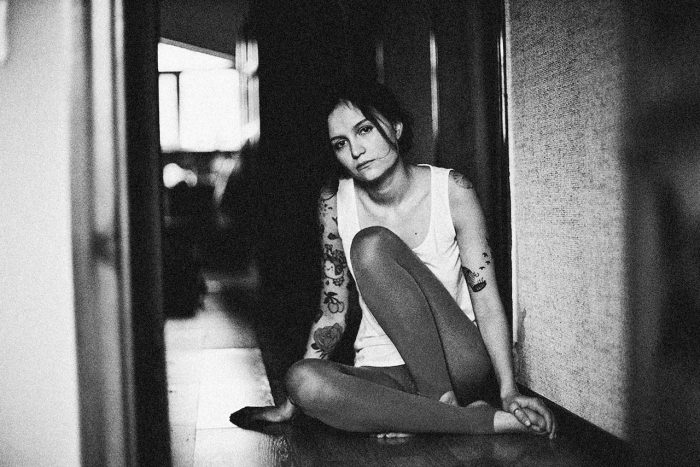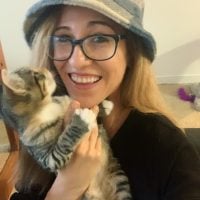“Bliss is a beautiful destination, but you can often only reach its shores after a turning point. It’s as if the universe is testing you to be sure you are strong enough to make it through the murky waters, not just the serene ones, so that you can move to a new and unknown place in yourself.” ~ Alicia Keys
I dated a lot in my 20s.
Similar to binge-eating junk food though, few of those situations resulted in health. In many of them, I cast aside my needs—denying myself in attempt to make a relationship work with a person who wasn’t right for me for one reason or another. Many of them also negatively affected my sleep and well-being.
It took a diagnosis of Celiac, an autoimmune disease wherein gluten damages the villi of the small intestine, making it difficult to absorb nutrients (the only cure is to adhere to a lifelong gluten-free diet) last October to turn this pattern around. But it took a few weeks to get there.
One initial worry I had was about how the diagnosis would impact my dating life. I wondered if it would demote me. Whether it was a subtraction from whatever currency still remained (I was in a depressive state at this time in my life, and my self-esteem was lower than it is now).
Unless it’s a place that’s specifically gluten-free, the risk of gluten cross-contamination makes many restaurants unsafe for Celiac people to eat at. This might lead dating prospects to feel limited by our condition. Ignorance leads some to believe that Celiacs are high-maintenance and nit-picky—even though we’re just trying to protect our health from something that legitimately harms us.
I’d read things such as how a 2018 survey “found that more than 40 percent of people say they would be ‘reluctant’ to date someone who avoids gluten because they perceive gluten-free eaters as ‘high maintenance.’ The emotional burden of the gluten-free diet can become compounded if your date loves to eat gluten.”
Celiacs are reminded of our lower-tier status in various ways (many subtle, others not so much). I’ve joked that we live in a gluten-normative world, with non-Celiacs as “the Wheat Majority” given how prevalent and difficult to escape from gluten is (much like heteronormativity).
~
Within a few weeks my mentality had shifted. As I began taking better care of myself and feeling healthier than I had in a long time, I realized that Celiac didn’t make me a less attractive partner. Rather, by equipping me with a new lens of discernment, it even gave me the tools to screen out bad matches and unsuitable fits.
As Jennifer Esposito put it, “The woman I spoke to said in not so many words, ‘Don’t eat here if you can’t eat gluten.’ Her brutal honesty hurt me, but at the same time, also saved me from eating there and getting sick. I was glad to have the opportunity to take my business elsewhere.”
Celiac forces us to narrow our options, making us more mindful of our food choices. I had to cut out a significant amount of foods and gluten-containing products.
I did the same with dating options.
Read the labels a company prints on their food. When a food tells you who it is, listen to it, I’d say when grocery shopping.
Read the labels a dating contender places on themself. When the unavailable person tells you who they are, listen to them, I’d say of prospective partners when out on dates.
Though finding them may be less convenient, there are gluten-free options out there. As Jenny Finke wrote, “There are other fish in the sea; it just takes time and effort to find your perfect match.”
Similarly, the compatible and available partners may not be as plentiful, but they do exist.
Following the diagnosis I decided I’d be the partner for myself that I’d long (futilely) sought to no avail in others. Months before it, I’d made a list of qualities I wanted in a romantic partner. Later on, I took that list and said, “This is who I’m going to be for myself while I’m healing.”
~
When I look back on many of my dating experiences, I see myself reaching a lot of that time—unconsciously looking to another person, or a force outside of myself, for relief or distraction from bodily discomfort, handing over my power in doing this.
In some ways the Celiac diagnosis felt like a brick sent down from the universe, demanding that I shift course—that I finally provide myself the care I’d been unconsciously seeking from others. It woke me to the necessity for radical change.
For years I’d have the same recurring dream about the women I dated. In them, she was always unsteady—from the weight of her own unresolved mental health issues that I was overstepping in trying to fix. I would try to hold her up. Be an anchor. The problem was always that I was wobbling too. We’d both fall to the ground.
I had these dreams often. After my diagnosis, a new one replaced them. The person I was trying to hold up was myself—younger versions of it. Me as a kid, teenager, young adult.
In these newer dreams I’m no longer wobbling. I’m at long last staying steady for us both.
I’m more discerning these days. It’s easier for me to say no or pass when confronting options. If the right relationship comes along, I’m open to it—but I’m also not waiting on it to be happy. Nor will I go out of my way for one. I know now that connection can come from friends; from passion projects; from spending time in scenery that is so majestic and awe-inspiring and separate from my own ego that it makes me want to cry; from watching my cats Mickey and Callie alternate between grooming and chasing each other around the house.
I embody that partner I’d long wanted someone to be for me. And I remind myself that alone doesn’t mean lonely. It’s how you navigate the solitude that determines how empty or full you’ll feel.
~
Please consider Boosting our authors’ articles in their first week to help them win Elephant’s Ecosystem so they can get paid and write more.












Read 9 comments and reply